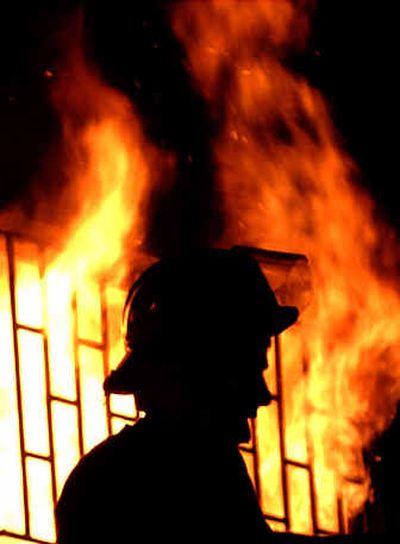Beirut bomb blast sparks fires, tension

BEIRUT, Lebanon – A bomb blast set off huge fires in a mainly Christian suburb of Beirut on Saturday, injuring five people in the third such attack in eight days. Opposition leaders blamed Syria, saying Damascus hoped to sow fear as it withdraws troops from Lebanon.
The latest attack, targeting an industrial area in Beirut’s northeastern Bouchrieh area, raised tensions another notch in Lebanon, which has been gripped by political turmoil over Syria’s presence since the Feb. 14 assassination of former premier Rafik Hariri.
A 55–pound bomb was placed between a car and a furniture factory, said Lebanon’s police chief, Maj. Gen. Sarkis Tadros, citing an explosives expert. The blast destroyed nearby cars, shattered windows and left a crater that was 3 feet deep and 10 feet wide.
A Lebanese woman and two Indian workers were injured, as were two civil defense workers working on extinguishing the fire that engulfed at least six buildings, security officials said.
“They must love us – we got it twice in a week,” Bouchrieh Mayor Antoine Gebara told Lebanese Broadcasting Corp. He was referring to last Saturday’s explosion in the nearby predominantly Christian neighborhood of Jdeideh that injured nine people. Five days later, another bomb blast killed three people near the port city of Jounieh, Lebanon’s Christian heartland.
Witnesses said the blast on the eve of the Easter holiday occurred three hours before Catholics were to head to a midnight Mass.
The motive behind the latest attacks wasn’t clear, but Lebanese opposition leaders have blamed Syrian security agents and pro-Damascus Lebanese authorities for trying to show a need for Syria’s military presence in Lebanon in the midst of a Syrian troop withdrawal.
Each attack has targeted Christian, anti-Syrian strongholds, raising fears of the return of the sectarian violence that plagued Lebanon during the 1975-90 civil war.
“They (Syrians) think they can destroy Lebanese national unity this way. But the Lebanese will remain steadfast till infinity,” exiled Christian opposition leader Michel Aoun told Al-Arabiya TV.
Aoun said the situation calls for “changing the security organizations related to Syria. This can’t be delayed.”
The death of Hariri, who opposed Syria’s presence, sparked massive demonstrations in Lebanon that disrupted the government and helped force Damascus to pull back its 14,000 troops to eastern Lebanon under international pressure. Many Lebanese accuse the governments in Beirut and Damascus of being behind the slaying, a claim both vehemently deny.
About 1,000 of the 10,000 Syrian soldiers remaining in eastern Lebanon’s Bekaa Valley had started heading home in recent days, a Lebanese military official said Saturday. The redeployments follow the return to Syria of 4,000 soldiers in the first phase of the troop withdrawal that was completed March 17.
Lebanon’s pro-Syrian Defense Minister Abdul-Rahim Murad warned that the Lebanese army may not be able to handle security if Syrian forces leave the eastern Bekaa Valley, a strategically important region for Syria’s own security, particularly in facing rival Israel.